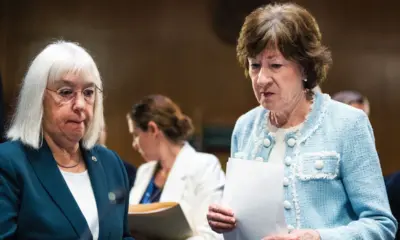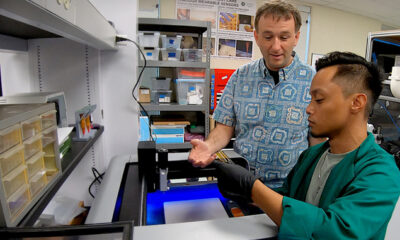Science
Syracuse University Secures $19.7 Million in NSF Funding for 2025

The National Science Foundation (NSF) awarded a total of $19.7 million in funding for research projects at Syracuse University during the fiscal year 2025. This figure marks an increase of $5.8 million compared to the previous year, highlighting the university’s growing research capabilities.
According to the Office of Research, the NSF also honored four faculty members with prestigious Faculty Early Career Development (CAREER) Awards, which are aimed at supporting early-career academic professionals in their research and teaching endeavors. Duncan Brown, vice president for research at the university, noted that this funding and recognition underscore the quality and innovation of research being conducted on campus. He emphasized, “Such positive outcomes show how important it is that our researchers continue to apply for federal grants. Doing so helps assure that continuing projects can maintain their momentum without interruption and that new research ideas have the support they need to realize societal impact.”
CAREER Award Recipients
The recipients of this year’s CAREER Awards are:
– Xiaoran Hu, assistant professor of chemistry in the College of Arts and Sciences
– Bryan Kim, assistant professor of electrical engineering in the College of Engineering and Computer Science
– Georgia Mansell, assistant professor of physics in the College of Arts and Sciences
– Baobao Zhang, Maxwell Dean Associate Professor of the Politics of AI in the Maxwell School of Citizenship and Public Affairs
Each awardee is engaged in groundbreaking research. For instance, Xiaoran Hu focuses on developing new materials sensitive to mechanical forces, enabling them to change color when deformed. This innovation allows materials to self-report damage, advancing studies in both synthetic and biological systems.
Similarly, Bryan Kim aims to enhance the compatibility and performance of software systems and hardware devices through his research on implicit data hints. This work is particularly relevant for modern computing needs, such as those found in artificial intelligence and big-data analytics.
Georgia Mansell contributes to the detection of gravitational waves, utilizing advanced detectors that can identify the subtle ripples in space caused by cosmic phenomena. In addition, she is exploring the application of “squeezed light” to enhance the precision of these detectors.
Baobao Zhang, meanwhile, employs quantitative methods to examine how citizen interests and expert insights can shape the governance of emerging technologies, with a focus on artificial intelligence.
Record Year for NSF Funding
The $19.7 million awarded in 2025 represents the highest funding received since 2022. Chetna Chianese, senior director in the Office of Research Development (ORD), highlighted that this achievement reflects the faculty’s commitment to research excellence, even amidst evolving federal funding landscapes.
The NSF funding supports diverse projects across five schools and colleges, encompassing various research domains. These include an interdisciplinary training program for doctoral students in emergent intelligence, initiatives for the Center for Gravitational Wave Astronomy and Astrophysics, and efforts to explore new physics at the LHCb experiment at CERN, the European center for nuclear research.
In addition to this, the funding supports programs aimed at upskilling technicians in photonics and training undergraduates in research experiences, showcasing a comprehensive approach to education and innovation at Syracuse University.
The Office of Research provides extensive support to faculty pursuing external funding opportunities. Staff members offer insights into external funding sources and help faculty develop competitive proposals. Faculty interested in obtaining NSF and other grants can collaborate with ORD staff to enhance their proposals.
The NSF CAREER Cohort Program, which assists faculty in planning and drafting their proposals, will resume in the upcoming spring semester, ahead of the summer 2026 deadline. Chianese remarked that the office keeps faculty informed about changes in federal funding and provides tailored guidance for specific projects.
For more information on securing research funding, faculty can reach out to the ORD staff at [email protected]. This proactive approach ensures that Syracuse University faculty remain well-equipped to advance their research initiatives and contribute significantly to their respective fields.
-

 Science1 month ago
Science1 month agoNostradamus’ 2026 Predictions: Star Death and Dark Events Loom
-

 Technology2 months ago
Technology2 months agoOpenAI to Implement Age Verification for ChatGPT by December 2025
-

 Technology7 months ago
Technology7 months agoDiscover the Top 10 Calorie Counting Apps of 2025
-

 Health5 months ago
Health5 months agoBella Hadid Shares Health Update After Treatment for Lyme Disease
-

 Health5 months ago
Health5 months agoAnalysts Project Stronger Growth for Apple’s iPhone 17 Lineup
-

 Technology5 months ago
Technology5 months agoElectric Moto Influencer Surronster Arrested in Tijuana
-

 Education5 months ago
Education5 months agoHarvard Secures Court Victory Over Federal Funding Cuts
-

 Health5 months ago
Health5 months agoErin Bates Shares Recovery Update Following Sepsis Complications
-

 Technology7 months ago
Technology7 months agoMeta Initiates $60B AI Data Center Expansion, Starting in Ohio
-

 Technology6 months ago
Technology6 months agoDiscover How to Reverse Image Search Using ChatGPT Effortlessly
-

 Science4 months ago
Science4 months agoStarship V3 Set for 2026 Launch After Successful Final Test of Version 2
-

 Technology7 months ago
Technology7 months agoRecovering a Suspended TikTok Account: A Step-by-Step Guide





















